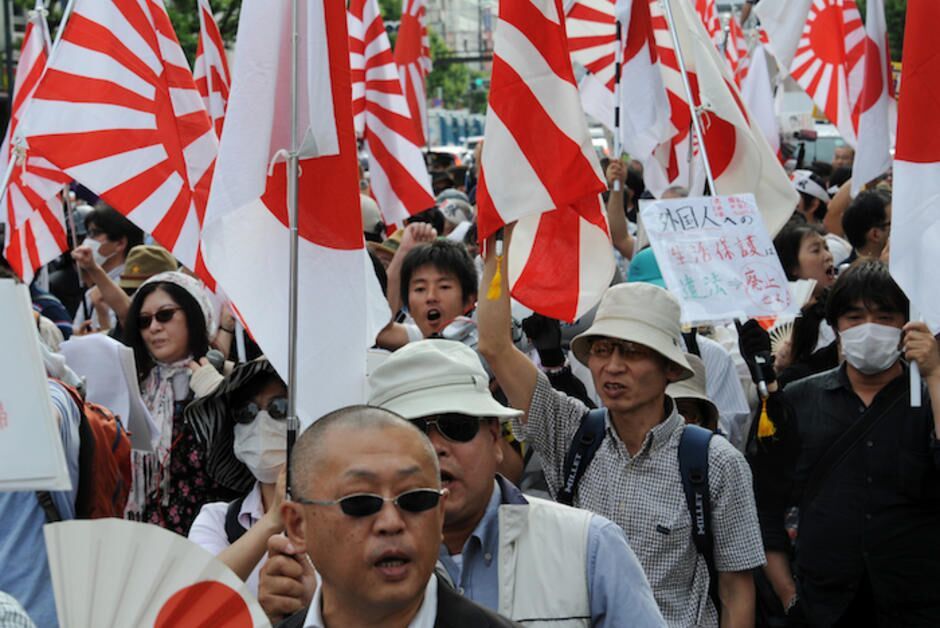UNITED NATIONS – Japan’s prime minister said Tuesday that his nation needs to attend to its own demographic challenges posed by falling birth rates and an aging population before opening its doors to refugees.
Prime Minister Shinzo Abe announced at the U.N. General Assembly that Japan is ramping up assistance in response to the exodus of refugees to Europe from the Middle East and Africa.
He said Japan will provide $1.5 billion in emergency aid for refugees and for stabilization of communities facing upheaval. But speaking to reporters later Tuesday he poured cold water on the idea of Japan opening its doors to those fleeing.
“I would say that before accepting immigrants or refugees we need to have more activities by women, by elderly people and we must raise (the) birth rate. There are many things that we should do before accepting immigrants”
Claim Your FREE Donald J. Trump Commemorative Coin While Supplies Last
He said Japan first needed to attend to domestic challenges which he proposes to tackle under a revamped economic policy that aims to boost GDP to a post-war record level, while bolstering the social security system to support families.
“As an issue of demography, I would say that before accepting immigrants or refugees we need to have more activities by women, by elderly people and we must raise (the) birth rate. There are many things that we should do before accepting immigrants,” Abe told a news conference, according to the official translation of his comments.
He added that Japan would “discharge our own responsibility” in addressing the refugee crisis, which he described as helping to improve conditions that cause the exodus.
Abe earlier told the world body that Japan would provide $810 million this year for emergency assistance of refugees and internally displaced persons from Syria and Iraq, triple what it gave last year. Abe said Japan is also preparing about $750 million for stabilization efforts in the Middle East and Africa.
Japan prides itself on being a good global citizen. It is one of the largest aid donors in the world. Last year Japan gave $181.6 million to the UNHCR, the United Nations’ refugee agency, making it second only to the United States in generosity.
But it has offered very few if any resettlement places for refugees from the civil war in Syria.
According to Ministry of Justice data, it accepted just 11 asylum seekers out of a record 5,000 applications last year, although Japanese officials say most of the asylum applicants were from other Asian countries and were already living in Japan.
Some argue that increased immigration could help arrest a shrinking population, which is currently 126 million. Abe says he is determined to ensure that in 50 years the Japanese population has stabilized at 100 million.
War on cartels yields results as ‘El Chapo’ heir confesses to running violent drug empire
Trump grants ‘total authorization’ to ICE agents to protect themselves after violent California clashes
Pennsylvania officials report intermittent failures in statewide 911 service
Trump’s Recovery Response Draws Rave Reviews: ‘A Focus On Delivering for the People’
‘Hole in One from the Moon’: US Museum Makes Rare Find In Its Own Backyard
Inside longtime Biden aide’s marathon closed-door grilling in House GOP cover-up probe
Allegedly ‘Raw’ Epstein Video Footage ‘Likely Modified’: Metadata Analysis
Bongino Reportedly Issues Shock Ultimatum: It’s Bondi or Me
David Gergen, trusted White House advisor to 4 US presidents across decades, dies at 83
Senate moves to rein in Trump administration’s fluctuating Ukraine policy
Ken Paxton’s Senator Wife Files for Divorce ‘On Biblical Grounds,’ Shakes Up Primary
DHS arrests five illegal immigrants convicted of serious crimes, including murder and child abuse
Border Chief Annihilates Newsom with Simple Facts After Governor Calls Trump ‘The Real Scum’
FBI’s Dan Bongino thinking of resigning after clash with AG Pam Bondi over Epstein files fallout: Source
Who is Ashley Williams, the longtime Biden aide grilled by House GOP investigators Friday?
Japan considers doubling number of refugees to 60 starting in 2020
Japan will consider accepting more Asian refugees from 2020, with an eye to doubling the current annual ceiling of about 30 to strengthen its response to regional humanitarian needs, government sources said Monday.
The government will review its current policy of receiving refugees only from Myanmar under the third-country resettlement program led by the UNHCR, the United Nations refugee agency, while promoting their settlement not only in Tokyo and surrounding areas but in other parts of the country, according to the sources.
Tokyo is expected to convey the idea to U.N. High Commissioner for Refugees Filippo Grandi, who is scheduled to visit Japan from Wednesday, the sources said.
Since 2010 under the third-country resettlement program, Japan has accepted a total of 174 Myanmar refugees, or 44 families, including some Rohingya Muslims from the western Rakhine State who had been persecuted and moved to neighboring Thailand and Malaysia.
Japan is known for its tight immigration policy. In 2017, the country accepted only 20 of about 20,000 people who applied for refugee status and allowed 45 to stay in the country on humanitarian grounds, according to the Justice Ministry.
Japan’s acceptance of refugees has been conducted in line with the U.N. convention governing refugees as well as with the third-country resettlement program. In the former case, the Japanese government examines each application for refugee status, while in the latter the UNHCR seeks applicants and the Japanese side selects the refugees it will accept for resettlement.
The refugees accepted under the current resettlement program stay for about six months in Tokyo to learn the Japanese language and then move to areas where they will settle.
Claim Your FREE Bullet Bottle Opener While Supplies Last
The government decided to review the scheme as it is receiving the 10th group of resettlement refugees in the fall next year. Possible changes will include accepting refugees twice a year from the current once a year, the sources said.
The government is also considering accepting refugees other than those from Myanmar, but arrangements on which nationals should also be covered by the program have not been finalized.
As for the settlement locations, the government decided in May last year to encourage refugees to live in rural areas that are facing a decline in population. So far, many of the refugees that have come to Japan have settled in Saitama, Chiba and Kanagawa prefectures, where there are already systems to support them.
The envisioned review of the program is expected to accelerate refugee resettlement in rural areas, with a Foreign Ministry official saying the government is “actively studying” the possibility of selecting areas other than the Tokyo metropolitan region.
Candidate sites will be assessed based on whether there are jobs for refugees, accommodation that matches their income and an environment to learn the Japanese language. But some critics say that assistance following the resettlement is still not enough.
The revision is likely to take place before the summer of 2019, with the expanded annual ceiling to be applied to refugees coming to Japan in the fall of 2020, the sources said.
The move comes as the government plans to accept more foreign workers by setting up a new residence status for those working in sectors deemed to be short of labor, such as nursing and construction, as the country struggles with a rapidly graying population and low birth rate.
On Monday, the ruling Liberal Democratic Party’s Judicial Affairs Division kicked off discussions on a draft government bill to amend the Immigration Control and Refugee Recognition Act, the main pillar of which is the introduction of the new residence status.
But some members of the LDP division expressed caution over the new status, pointing to a possible deterioration in public safety resulting from an increase in the number of foreigners in the country.
Shigeharu Aoyama, an Upper House member, said he absolutely opposes the law revision, stressing that the employment of Japanese people should be increased first to solve the nation’s labor shortages. One participant called for the division to spend sufficient time examining the legislation.
Some critics view the plan to accept more foreign workers as a way to import cheap labor, given that foreigners from developing countries who receive on-the-job training under government programs are often found to have been made to work under poor conditions.
























